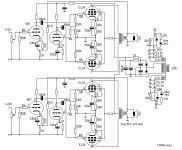Ooops, thanks Jeff. I do see one on ebay with the 12AX7 engraved on the plate, but the specs state 6N2, so who knows, until you look under the bonnet. I always say there's a new surprise with each and every Chinese amp 🙂 And for me the biggest surprises came from measuring the OPT's. The Meng Yue 6P1P seems to have pretty good OPT's though. If you take the bottom cover off Chops, and take some pics, I can probably find a schem that fits it.
Ooops, thanks Jeff. I do see one on ebay with the 12AX7 engraved on the plate, but the specs state 6N2, so who knows, until you look under the bonnet. I always say there's a new surprise with each and every Chinese amp 🙂 And for me the biggest surprises came from measuring the OPT's. The Meng Yue 6P1P seems to have pretty good OPT's though. If you take the bottom cover off Chops, and take some pics, I can probably find a schem that fits it.
Hi Ian,
Yeah, I'll be off tomorrow but have to do a 100 mile round trip first thing in the morning. After that, I should be home for good to take a look at this amp and see what it's like under the hood.
My brother said that our father already took a look at it, opening up the bottom and even pulling out the PCB as it has components mounted on both sides of it. I guess he was trying to see if he could find any obvious issues with the amp such as burnt resistors, loose solder joints, cracked PCB, scorch marks, etc, etc. Apparently he didn't see anything out of the norm.
My brother says he did a little research on the company and it is actually part of the Yaqin company. From what he read, these Mengyue amps are made up of all the scrap parts of Yaqin where the parts used are random pieces that are out of spec and are not up to Yaqin's standards. So they build these much cheaper Mengyue amps to use up those scrap parts and recoup some of that money on those components.
That's obviously why a lot of these cheaper Chinese amps always vary in the components used in them.
My brother says he did a little research on the company and it is actually part of the Yaqin company. From what he read, these Mengyue amps are made up of all the scrap parts of Yaqin where the parts used are random pieces that are out of spec and are not up to Yaqin's standards. So they build these much cheaper Mengyue amps to use up those scrap parts and recoup some of that money on those components.
Aw, I don't know about that, I have seen the same cheap parts in an $800 amp. I doubt they even test the components much, let alone sort them into different grades, but anything is possible. Sounds like a bit of advertising blurb to me. I bought 5 different amps from 4 different Chinese amp manufacturers, but not Yaqin. They all suffered from various problems, the most common single downfall was poor circuit design, and some had unusual OPT primary impedances. I had no problems from coupling caps or resistors.
Aw, I don't know about that, I have seen the same cheap parts in an $800 amp. I doubt they even test the components much, let alone sort them into different grades, but anything is possible. Sounds like a bit of advertising blurb to me. I bought 5 different amps from 4 different Chinese amp manufacturers, but not Yaqin. They all suffered from various problems, the most common single downfall was poor circuit design, and some had unusual OPT primary impedances. I had no problems from coupling caps or resistors.
I don't know. I'm just going by what he told me he read online. Whether it's accurate or not is a different story.
Here's some pics of the amp along with the last 3 photos that can be opened up to full rez images. I hope this helps out on figuring out the schematic for this thing.
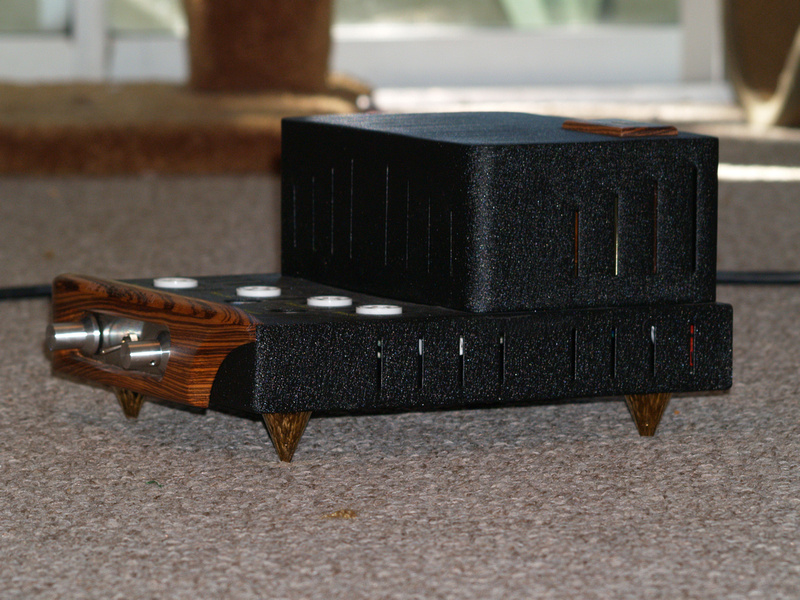
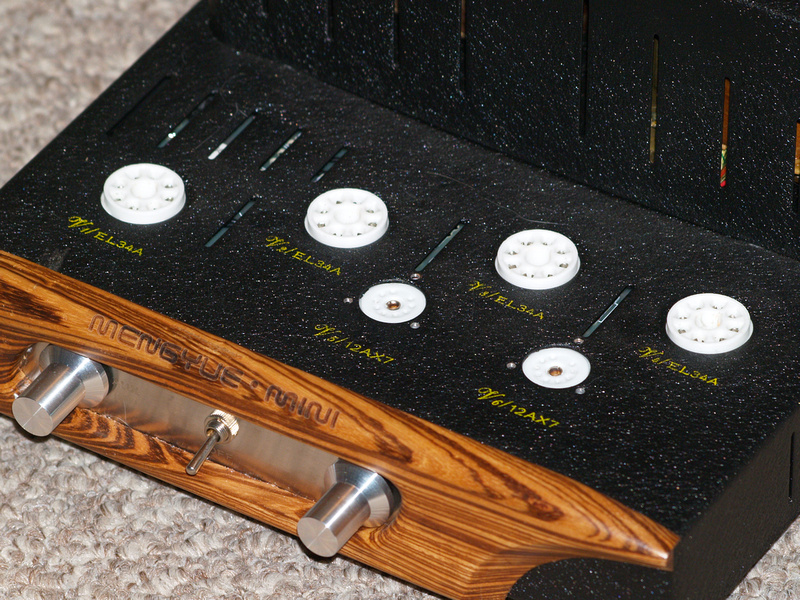
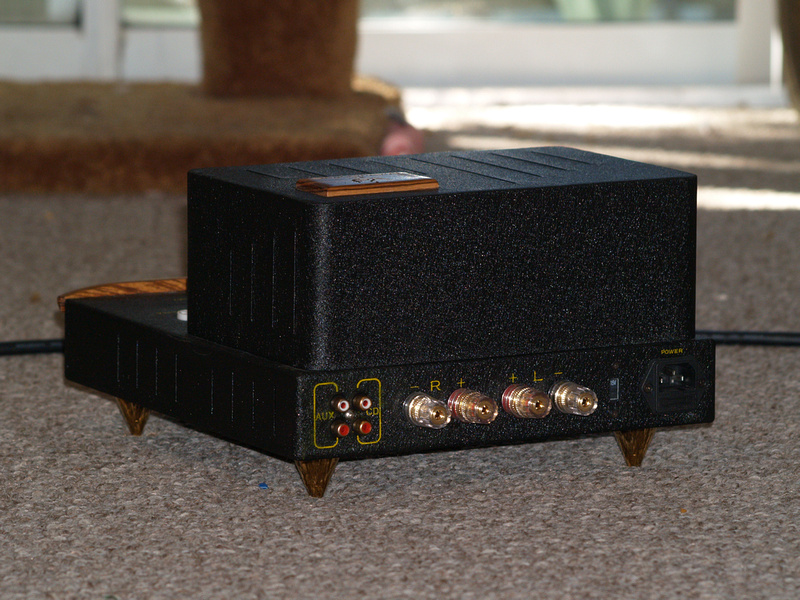
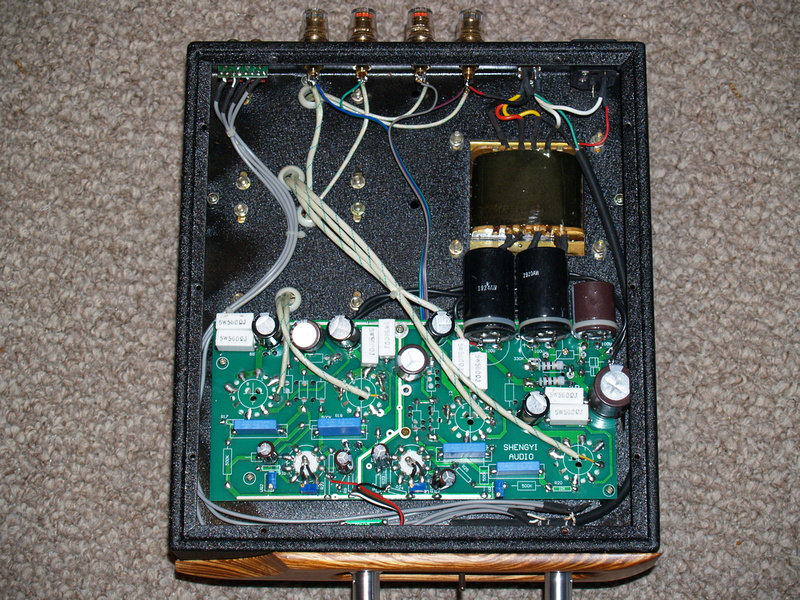
The ole' Baldwin pulling double duty as a space heater in the background! 😀
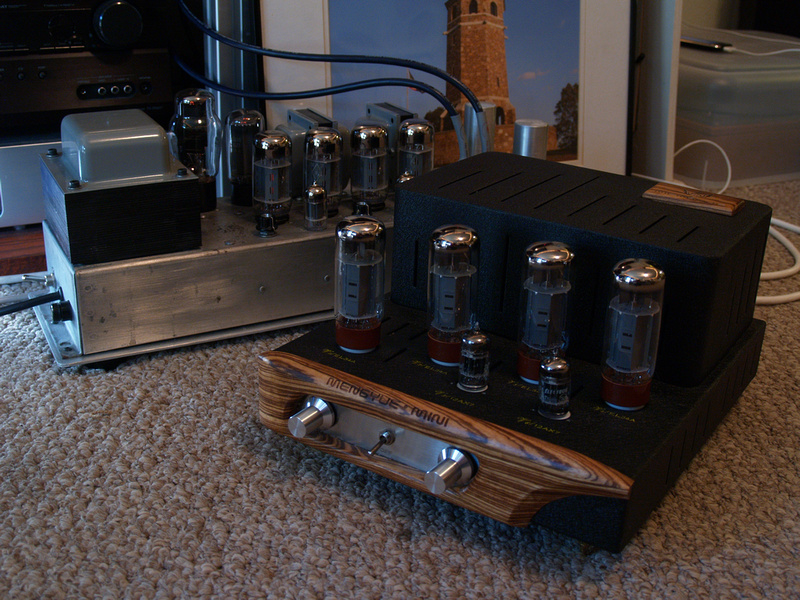
Full Rez Images
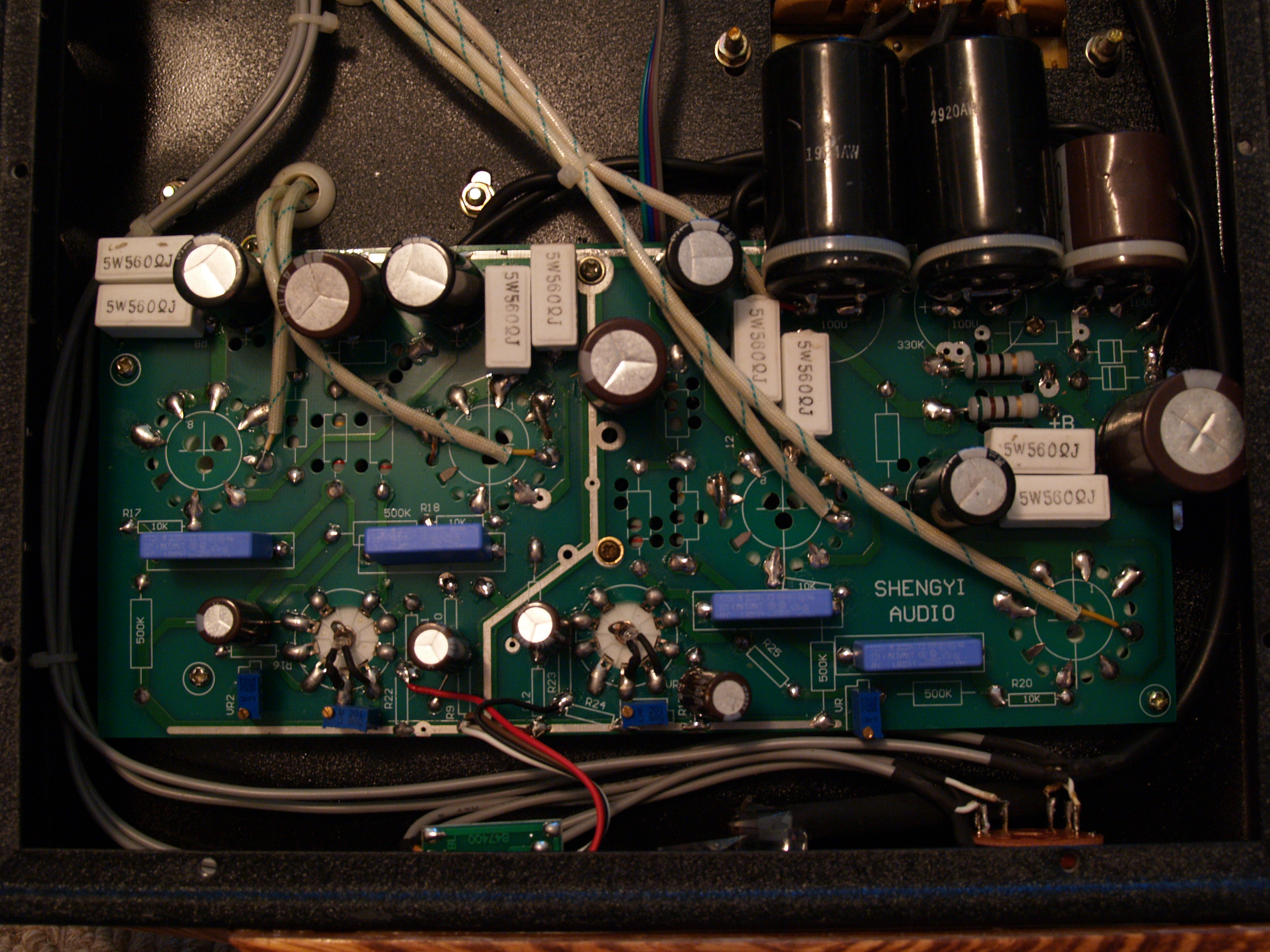
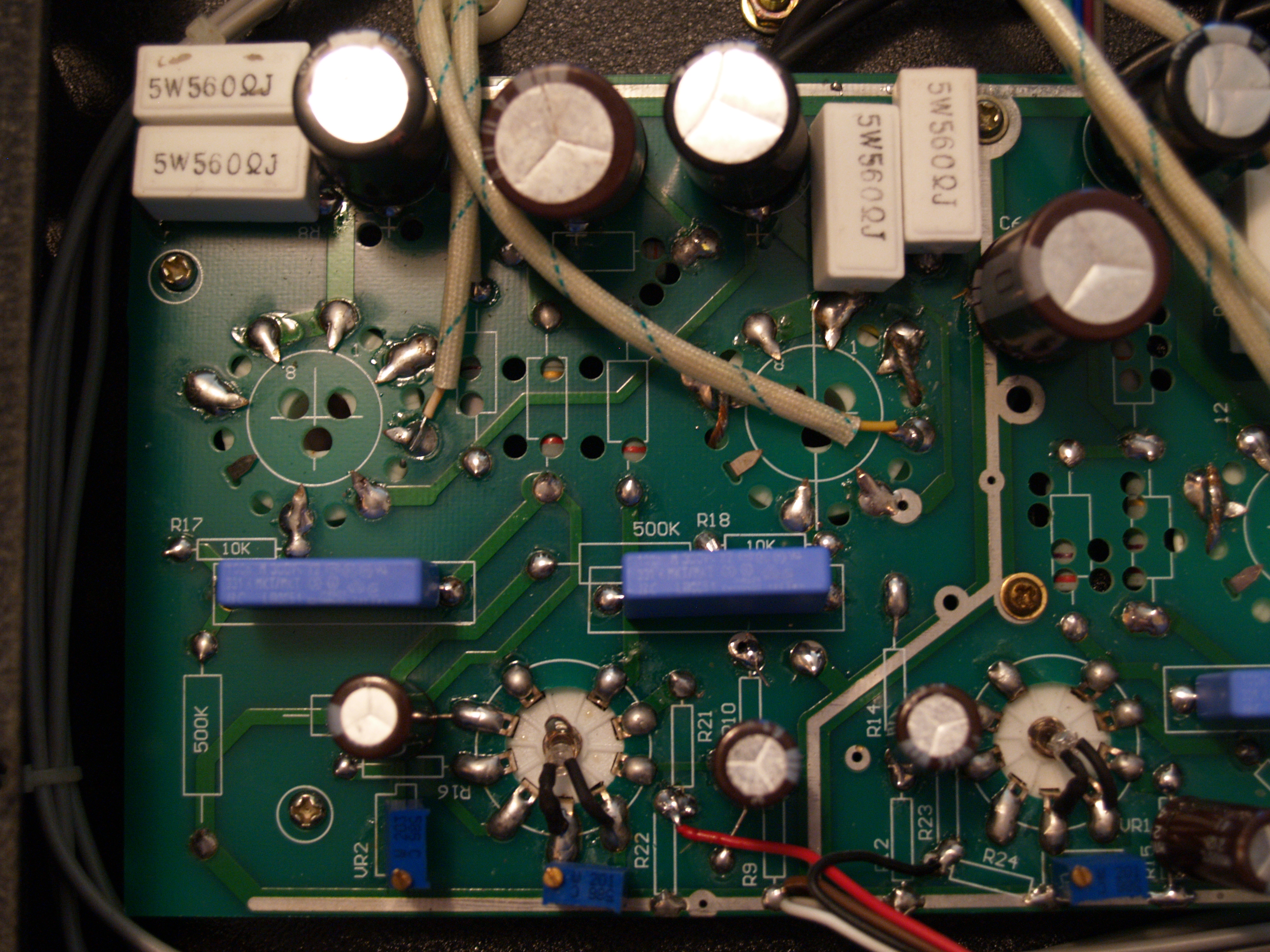
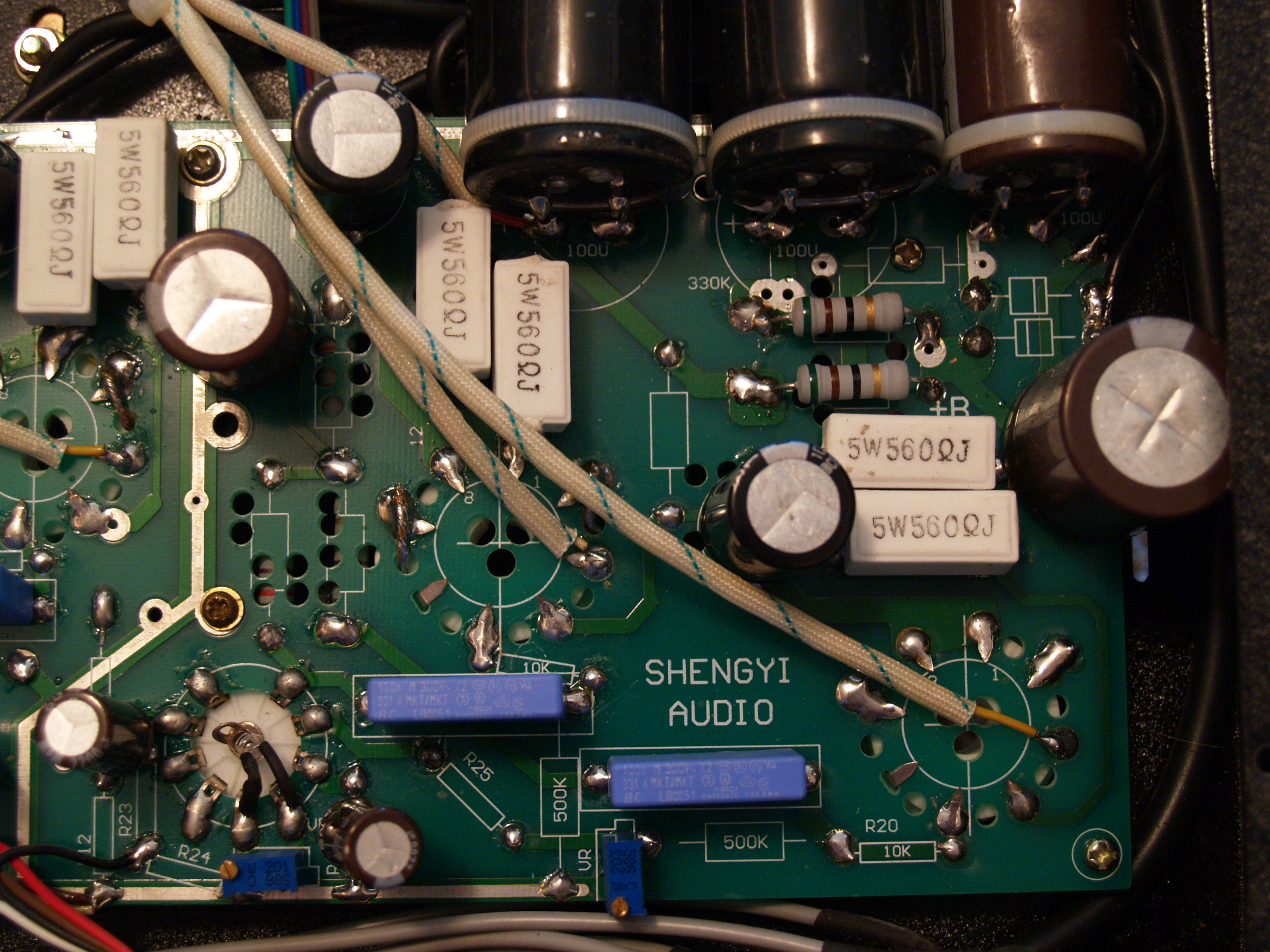




The ole' Baldwin pulling double duty as a space heater in the background! 😀

Full Rez Images



Did yo try the 33nF DC blocking caps (47nf or 100nF is also fine)? These should be in series with the red and black wires coming from the volume pot. A ~250Vac X2 type cap works pretty good here.
Looking at the pictures, the front end tube socket seems to be wired for a 6.3V heater. Perhaps it is best to use the original tubes here as a starting point, and trake it from there.
/Tibor
Looking at the pictures, the front end tube socket seems to be wired for a 6.3V heater. Perhaps it is best to use the original tubes here as a starting point, and trake it from there.
/Tibor
The PCB does look like it's still wired for 6N2...the Chinese equivalent of 12AX7. A real 12AX7 plugged in would get half the required heater voltage I guess, if that is the case, dunno without measuring heater voltages. Anything could be possible...Is it possible a 12AX7 will function slightly with half heater voltage?
What doesn't make sense is the fact that the OP says that the sound will be louder in one channel, but then FADES over to the other channel.
Sorry, I didn't mean that it would fade back and forth while listening. Just when it started, it would play much louder in the right channel. I was running my laptop through it and didn't realize I had the rca's connected to the amp backwards.. I switched them, so then the left side was obviously louder. Sorry for the confusion... 😱
It's not the amplifier, it's your laptop - when you swapped input cables the problem moved from one channel to the other. Think about it for a minute. Then check the balance and level settings in the (windows?) mixer software..
It's not the amplifier, it's your laptop - when you swapped input cables the problem moved from one channel to the other. Think about it for a minute. Then check the balance and level settings in the (windows?) mixer software..
No, it's NOT the laptop as I said before. It even did it in my system, and there's no laptop in my system. It's even done it just by turning the amp off for a minute then turning it back on. If you read my post a couple posts back, you would have known that.
Not only that, why on earth would the settings in the laptop magically change on their own simply by swapping cables?! 🙄
Last edited:
No, it's NOT the laptop as I said before. It even did it in my system, and there's no laptop in my system. It's even done it just by turning the amp off for a minute then turning it back on. If you read my post a couple posts back, you would have known that.
Not only that, why on earth would the settings in the laptop magically change on their own simply by swapping cables?! 🙄
My comment was predicated on the fact that usually when you swap source connections and the problem follows the swapped cables that there is a problem with the source. (20yrs+ of audio engineering experience has at least taught me that.) Yes I did miss the post where it behaved the same way in your system. Obviously something else very odd is going on here. My comment about the laptop mixer controls did not imply that they magically or otherwise changed when you swapped the cables, it was a suggestion to check.
Good luck...
- Status
- Not open for further replies.
- Home
- Amplifiers
- Tubes / Valves
- Mengyue Mini EL34B stereo balance issues..
